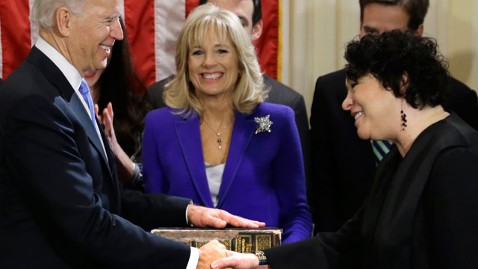President Obama exceeded his constitutional authority by making appointments when the Senate was on a break last year, a federal appeals court ruled Friday. The court’s broad ruling would sharply limit the power that presidents throughout history have used to make recess appointments in the face of Senate opposition and inaction.
A unanimous three-judge panel of the U.S. Court of Appeals for the District of Columbia Circuit flatly rejected the Obama administration’s rationale for appointing three members of the National Labor Relations Board (NLRB) while the Senate was on a holiday break.
Chief Judge David B. Sentelle sharply criticized the administration’s interpretation of when recess appointments may be made, saying it would give the president “free rein to appoint his desired nominees at any time he pleases, whether that time be a weekend, lunch, or even when the Senate is in session and he is merely displeased with its inaction.” He added, “This cannot be the law.”
The issue seems certain to end up before the Supreme Court, which ultimately could clarify a president’s authority to fill his administration and appoint federal judges when a minority of the Senate blocks consideration of his choices.
Although recess appointments have been made throughout the nation’s history, they have been more commonly made by modern presidents who face partisan opposition that has made it hard for nominees to even receive a vote in the Senate.
Additionally, Friday’s decision casts doubt on hundreds of decisions the NLRB has made in the past year, ranging from enforcement of collective-bargaining agreements to rulings on the rights of workers to use social media.
The ruling also raises questions about the recess appointment of former Ohio attorney general Richard Cordray to head the fledgling Consumer Financial Protection Bureau and about the actions taken by the agency during his tenure, including major new rules governing the mortgage industry. Obama named Cordray at the same time as the NLRB nominees, and his appointment is the subject of a separate lawsuit in D.C. federal court.
The White House criticized the court ruling. “The decision is novel and unprecedented, and it contradicts 150 years of practice by Democratic and Republican administrations,” White House press secretary Jay Carney told reporters Friday. “We respectfully but strongly disagree with the ruling.”
Presidents from both parties have made hundreds of recess appointments when the Senate has failed to act on nominations. Ronald Reagan holds the record with 243. Obama’s predecessor, George W. Bush, made 105, and it was during his term that Senate Democrats began holding pro-forma sessions, some lasting less than a minute, when the Senate went on break. They contended that that kept the Senate in session and did not allow Bush to make recess appointments.
Republicans took up the practice when Obama was elected. But Obama decided to challenge it in January 2012, when the Senate was on a 20-day holiday but holding pro-forma sessions every three business days to block presidential action.












